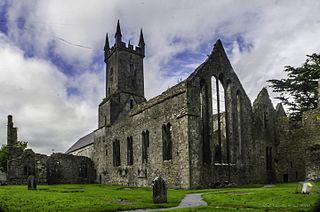
Shane O'Neill was an Irish chieftain of the O'Neill dynasty of Ulster in the mid-16th century. Shane O'Neill's career was marked by his ambition to be the O'Neill—sovereign of the dominant O'Neill family of Tír Eoghain. This brought him into conflict with competing branches of the O'Neill family and with the English government in Ireland, who recognised a rival claim. Shane's support was considered worth gaining by the English even during the lifetime of his father Conn O'Neill, 1st Earl of Tyrone. But rejecting overtures from Thomas Radclyffe, 3rd Earl of Sussex, the lord deputy from 1556, Shane refused to help the English against the Scottish settlers on the coast of Antrim, allying himself for a short time instead with the MacDonnells, the most powerful of these settlers. Shane viewed the Scottish settlers as invaders, but decided to stay his hand against them with hopes of using them to strengthen his position with the English. However, tensions quickly boiled over and he declared war on the Scottish MacDonnell's defeating them at the Battle of Glentaisie despite the MacDonnells calling for reinforcements from Scotland. The Scottish MacDonnells would later assassinate Shane O'Neill and collect the bounty on his head.
McMahon, also spelt MacMahon, were different Middle Age era Irish clans. Their name is derived from the Gaelic MacMathghamhna meaning 'son of the bear'.
Toirdhealbhach Mór Ua Conchobhair anglicised Turlough Mór O'Conor, was King of Connacht (1106–1156) and High King of Ireland.
Toirdelbach Ó Conchobair, anglicised Turlough O'Conor, was one of a number of claimants to the kingship of Connacht in the disastrous aftermath of the Second Battle of Athenry. He overthrew Rory na BhFeadh but was himself overthrown in 1318.

Domhnall Ua Lochlainn, also known as Domhnall Mac Lochlainn, was king of the Cenél Eogain, over-king of Ailech, and alleged High King of Ireland.
Toirdhealbhach Ua Briain, anglicised Turlough O'Brien, was King of Munster and effectively High King of Ireland. A grandson of Brian Bóruma, Toirdelbach was the son of Tadc mac Briain who was killed in 1023 by his half-brother Donnchad mac Briain.

Muircheartach Ua Briain, son of Toirdelbach Ua Briain and great-grandson of Brian Boru, was King of Munster and later self-declared High King of Ireland.

Tír Eoghain, also known as Tyrone, was a kingdom and later earldom of Gaelic Ireland, comprising parts of present-day County Tyrone, County Armagh, County Londonderry and County Donegal (Raphoe). The kingdom represented the core homeland of the Cenél nEógain people of the Northern Uí Néill and although they ruled, there were smaller groups of other Gaels in the area. One part of the realm to the north-east broke away and expanded, becoming Clandeboye, ruled by a scion branch of the O'Neill dynasty. In one form or another, Tyrone existed for over a millennium. Its main capital was Dungannon, though kings were inaugurated at Tullyhogue Fort.
Diarmaid is a masculine given name in the Irish language, which has historically been anglicized as Jeremiah or Jeremy, names with which it is etymologically unrelated. The name Dimity might have been used as a feminine English equivalent of the name in Ireland. Earlier forms of the name include Diarmit and Diarmuit. Variations of the name include Diarmait and Diarmuid. Anglicised forms of the name include Dermody, Dermot and Dermod. Mac Diarmata, anglicised McDermott and similar, is the patronymic and surname derived from the personal name. The exact etymology of the name is debated. There is a possibility that the name is derived in part from dí, which means "without"; and either from airmit, which means "injunction", or airmait, which means "envy". The Irish name later spread to Scotland where in Scottish Gaelic the form of the name is Diarmad; Anglicised forms of this name include Diarmid and Dermid.
Events from the year 1156 in Ireland.

Murrough O'Brien, 1st Earl of Thomond was the last King of Thomond, and a descendant of the High King of Ireland, Brian Boru.
Events from the year 1562 in Ireland.
Toirdhealbhach is a masculine Irish given name. Forms of the name include Tarlach and Traolach. It is often anglicised Turlough. The name ultimately derives from Irish: toirdhealbh "prompting", and originated as a byname meaning "instigator".

Donnchadh mac Briain, son of Brian Bóruma and Gormflaith ingen Murchada, was King of Munster.
Áed Ua hOissín was consecrated first Archbishop of Tuam in 1152 and died in 1161. He was closely associated with Connacht royalty, and had served as abbot of Tuam.
Tadc mac Briain was the son of Brian Boru and Echrad, daughter of Carlus mac Ailella of Uí Áeda Odba. Tadc had one son, Toirdelbach Ua Briain, with his wife Mór, daughter of Gilla Brigte Ua Maíl Muaid of Cenél Fiachach.
Events from the year 1573 in Ireland.
Sir Turlough McHenry O'Neill is known for having been killed together with his father, Henry, fighting for the crown in O'Doherty's Rebellion and for being the father of Sir Phelim O'Neill, who started the Irish Rebellion of 1641.

Ennis Friary was a Franciscan friary in the town of Ennis, County Clare, Ireland. It was established in the middle of the 13th century by the ruling O'Brien dynasty who supported it for most of its existence. Following the suppression of the monasteries in the 16th century, the friary continued to function for a while despite the loss of its lands. In the early 17th century, the buildings were handed over to the Church of Ireland as a place of worship. It was used as such until the late 19th century. After the construction of a new Church of Ireland building, the friary fell into ruin. Managed by the Office of Public Works since the late 19th century, it was formally returned to the Franciscan Order in 1969.
Turlough O'Brien is a Gaelic football manager. He managed Carlow between 2014 and 2020. It may also refer to:






